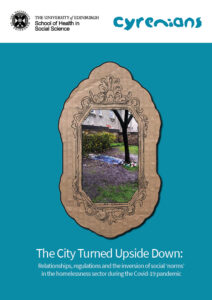To download the full report click here.

This is what the researchers found had happened:
The city turned upside down.
People who usually lived on the streets were moved into city centre hotels; people who usually lived in luxury city centre hotels were working from home; people who were frontline workers, were out in the parks using benches as offices.
And the result?
People experiencing homelessness were housed, some for the first time in many years.
Treatment was able to start to help with tackling longstanding mental and physical health issues.
The spread of Covid19 amongst the homeless population was prevented.
People working in the homeless organisations felt a sense of huge success.
And how did this all happen?
Relationships. Strong relationships between different organisations in the city, between frontline workers and people experiencing homelessness, between the decision makers and the frontline workers.
Relationships mattered. Relationships created action. Relationships brought solutions.
Overnight, almost, homelessness was ‘solved’ in many of our cities. So many people felt elated – the impossible had been achieved. Suddenly there was accommodation for all, everyone had a home, everyone was inside. If we can do this once, how do we do this again? What has to happen so we can build on this success? It all happened so quickly – and easily – could we achieve this in ‘non-covid’ times too?